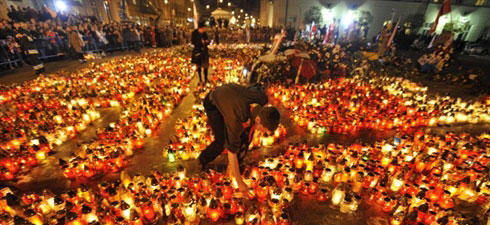Wawel cathedral in Crakow, the former capital of medieval Poland, is the final resting place of historic kings, national heroes and saints. And the announcement on the part of the Archbishop of Cracow to bury President Lech Kaczynski and his wife Maria in the national equivalent of London’s Westminster Abbey or the Paris Panthéon has caused much ink to flow. Early this week in an open letter published by Gazeta Wyborcza, Andrzej Wajda, director of a film on the Katyn massacre, the site which the late President was to visit on the day of his death insists that although Lech Kaczynski was “a good and modest man, Wawel is not a proper place for him”. These words have triggered a controversy which will go resounding long after the coffin bearing the president’s remains go down into the Wawel crypt.
Not about the man but the symbol
The debate is not just confined to the media. In recent days, several hundred-strong groups of supporters and opponents of a decision that liberal daily Gazeta Wyborcza described as “rash and emotional” confronted each other on the streets of Cracow and Warsaw. Those against argue that Kaczynski’s achievements in serving his country cannot be compared to those of the Polish kings or those of Marshal Piłsudski, father of national independence in 1918, buried there. “Has a tragic death turned the president into a hero? Is Kaczyński another Piłsudski, winner of one of the most crucial battles in Polish and European history [1920 Battle of Warsaw against the Soviets]?” asks sociologist Ireneusz Krzemiński in the pages of Rzeczpospolita.
In the same paper, an answer was quickly forthcoming from op-ed writer Robert Mazurek. “Can’t you just see that it’s not about the man as much as about a symbol? Don’t you understand the idea of burying symbols?” Mazurek also emphasises Kaczyński’s singularity as the first late president of the Solidarity generation, making a Wawel funeral also “a tribute to Solidarity.”
Poland is quarrelling again
Dziennik Gazeta Prawna points out that funerals of important national figures have been subject to national disputes in the past as well. This was the case with assassinated President Gabriel Narutowicz, buried in Warsaw, as well as Nobel prize for literature laureate Czesław Miłosz, buried in Cracow but not in Wawel. In Poland, the rule still holds that, ‘the greater the political significance attached to the funeral of an important personage, the greater the controversy it raises.” “This is why,” Dziennik Gazeta Prawna argues, “in the Wawel crypts lie those who always dreamed about lying here as well as those who never even dreamed of it. And perhaps they would never have agreed to be buried there at all.”
Observers feel that President Kaczyński would have numbered himself among the second group. According to historian Antoni Dudek quoted by Dziennik Gazeta Prawna, both those for and against a Wawel burial have acted too rashly. He argues that it would have been better to postpone such a decision until several, a dozen or even several dozen years had elapsed after the man’s death until his legacy had become “clear and agreed upon.” Dudek argues that “both sides have made a big mistake. Still, reluctantly or not, we’re quarrelling again. But how could we not be quarrelling? It’s our national pantheon, after all.”
Was this article useful? If so we are delighted!
It is freely available because we believe that the right to free and independent information is essential for democracy. But this right is not guaranteed forever, and independence comes at a cost. We need your support in order to continue publishing independent, multilingual news for all Europeans.
Discover our subscription offers and their exclusive benefits and become a member of our community now!












